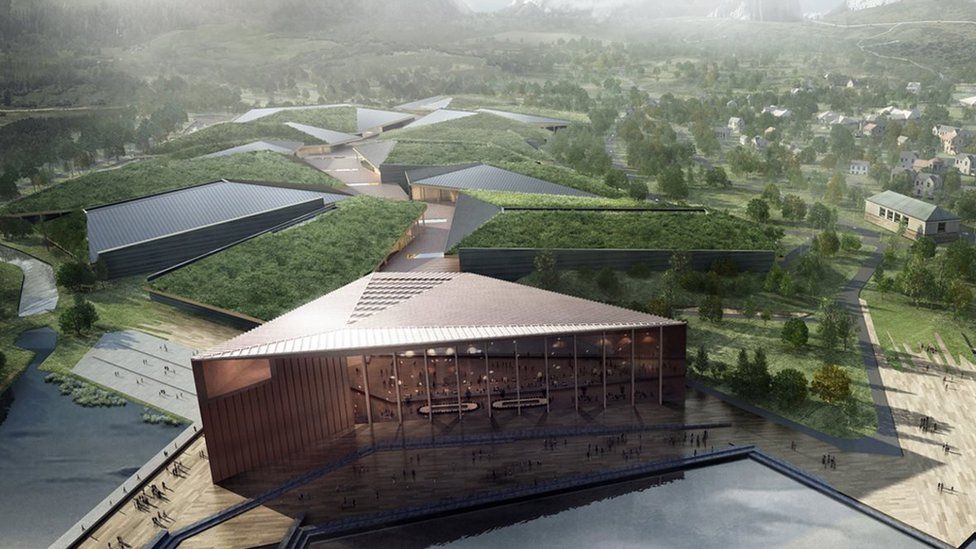Record-sized data centre planned inside Arctic Circle
- Published

Plans to build the world's "largest" data centre are being made public.
The facility is set to be created at the Norwegian town of Ballangen, which is located inside the Arctic Circle.
The firm behind the project, Kolos, says the chilled air and abundant hydropower available locally would help it keep its energy costs down.
The area, however, suffers the country's highest rate of sick leave from work, which may be related to its past as a mining community.
The US-Norwegian company says it has already raised "several million dollars" for the project from Norwegian private investors.
However, it is still working with a US investment bank to secure the remaining necessary funds.
It is basing its record-setting claims on the amount of power it intends to draw on to run its computer servers.
Initially, Kolos' base would draw on about 70 megawatts of power.
However, within a decade, the firm intends to have added enough computer server modules to draw on more than 1,000 MW.
Amazon's data processing division is already thought to draw on about 1,000 MW of power in Ashburn, Virginia, however its servers are spread across the area rather than being clustered together into a single centre.
Facebook has operated its own large data centre about 385km (239 miles) from Ballangen at Lulea, Sweden since 2013. But it is limited to 120 MW.
Other giant single-site data centres also tend to use less than 200 MW.
Cheap energy
When complete, the Ballangen development is set to cover 600,000 sq m (6.46m sq ft) and stretch over four storeys.
That is a bigger area than today's record-holder - a facility in Langfang, China - but slightly smaller than the final plan for a still-in-development centre in Nevada.
The Norwegian enterprise should benefit from the fact that large amounts of fibre optic cable were laid in the past alongside a railway built to transport mined iron ore to Sweden.
In more recent times, the EU and Norwegian government have invested in building large dams for hydroelectric projects. There are also several wind farms nearby.
"It's quite literally the lowest power cost in Europe - and 100% of the power is renewable on one of the most stable grids in the world," Kolos' co-chief executive Mark Robinson told the BBC.
"It's in a region of the planet that is naturally cool and has ideal humidity, so we can keep servers cool without having to artificially chill them," he added.
"It has unlimited access to fresh, clean cool water as a secondary chilling source.
"And there's a university nearby, which produces about 200 technology students a year - and the idea is to employ some of these."
When questioned about local sickness rates, Mr Robinson acknowledged that he had not been aware of the municipality's poor standing.
But he noted that the benefits to the local economy of hosting the centre could improve the situation.
Kolos says it already has the support of five local mayors, and Norway's climate and environment minister Vidar Helgesen will take part in a public meeting the firm has organised later this week.
"We want to see many projects come to fruition and I am supportive of this just as I am supportive of any other," Mr Helgesen told the BBC ahead of the event.
"We are not picking individual winners, but we have reduced our tariffs in order to welcome the establishment of data centres in Norway - and we welcome this initiative very much."
The major cloud infrastructure service providers - including Amazon, Microsoft and Google - have repeatedly cut their prices over recent years, putting pressure on other data centre operators.
Tech consultancy Gartner says this has meant private endeavours have needed to seek scale of their own in order to keep their prices competitive.
"There's always a danger with this kind of thing that providers rush to build capacity that outstrips what the market requires," added David Groombridge, research director at tech consultancy Gartner.
"But in terms of data centres, it's hard to see consumer-driven demands dropping off and there's the promise of the internet-of-things, with millions of sensors generating information that will need to be processed.
"So, unless there are radical new technologies that come along very quickly to help compress data, we will need the resources that these kind of facilities provide."
- Published13 July 2017
- Published7 September 2016
- Published2 February 2016
- Published14 June 2013